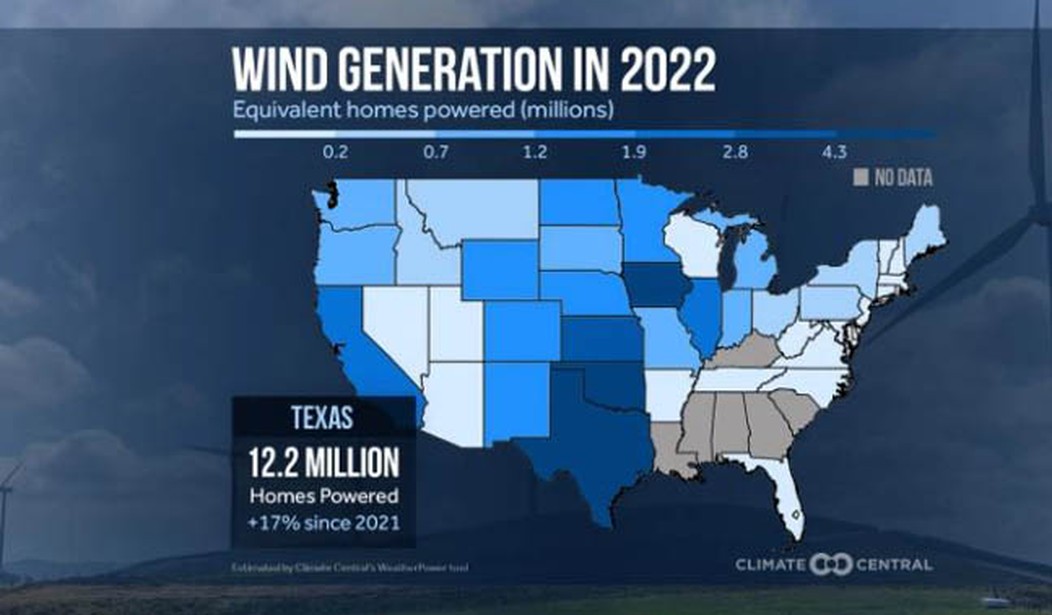I can’t say that I realized this before today and maybe you didn’t either but it turns out Texas is one of the nation’s leaders in both solar and wind energy production. This is from a NY Times opinion piece titled “Clean Energy Is Suddenly Less Polarizing Than You Think” which is about where some of the money from the Inflation Reduction Act will be going.
Between the signing of the I.R.A. and Jan. 31, announcements of the largest clean-energy investments have been in Georgia and Idaho, followed by Tennessee, then Michigan, then South Carolina and Texas, North Carolina, Ohio, Kansas, Nevada and Arizona. Between now and 2027, Texas is expected to add almost twice as much solar capacity as California. In expected development, Ohio, Nevada, Indiana and Florida rank third, fourth, fifth and sixth.
But the author goes on to point out this is just an acceleration of a pre-existing trend.
To a degree hardly anyone but wonks really appreciates, green energy in the United States was a heavily red-state phenomenon before the legislation even hit Mr. Biden’s desk in August. Already, Texas produces more renewable energy than anywhere else in the country — in fact, almost twice as much as California, the second biggest producer. In third, fourth and fifth place are Iowa, Oklahoma and Kansas. Judged by percentage of overall power use, the most prolific source of renewables is Iowa, followed by South Dakota. Then, after Vermont, come Kansas, Oklahoma, Maine and New Mexico.
When it comes to non-hydro renewable power, Texas is today producing more than the entire Midwest. It doubled its solar capacity from 2019 to 2020 and almost did so again from 2020 to 2021. You may think of Texas as hostile to green energy, given not just its oil industry but also its recent grid problems and widespread blackouts and the grandstanding of its fossil-friendly, climate-skeptic governor. But on the ground, the state is probably the biggest green-energy success story in the country.
Looking around I see this hasn’t gone unnoticed. Last month KXAN published a story on Texas’ leadership in this area. Just today there was an announcement from Duke Energy about a huge new solar plant in Texas which is now operating.
Duke Energy Sustainable Solutions (DESS), an arm of major U.S. utility Duke Energy, said commercial operation has begun on the group’s largest solar power plant. DESS on March 8 said the 250-MW Pisgah Ridge Solar farm in Navarro County, Texas, is online, supplying power to at least three groups as part of virtual power purchase agreements (VPPAs).
“We’re excited to continue to grow our Texas solar portfolio,” said Chris Fallon, president of Duke Energy Sustainable Solutions, in a statement. “This project demonstrates how we can continue to expand our renewable energy resources while providing unique sustainability solutions for commercial customers.”
It makes sense of course that Texas which has plenty of sun and wind and lots of big open land would capitalize on it. For those who live near these plants they can be (if you’ll excuse the pun) a windfall.
You probably haven’t heard of Coke County, Texas. Out of thousands of counties in America, it’s one of the smallest, with just 3,300 residents.
But it enjoyed the biggest economic boom of any county from 2019 to 2021, according to an analysis from the Bureau of Economic Analysis. In those two years, Coke County’s gross domestic product (GDP) rose by 83%, from $128 million to $235 million.
The growth is being credited to a surge in wind farm construction and other renewable energy initiatives. New wind farms are paying landowners in Coke County annual royalties of up to $10,000 while creating jobs and lowering energy costs.
Not surprising that some counties would be happy to see an influx of that kind of money. Still, it’s a surprise to me that Texas is one of our leading green energy producers and is likely going to accelerate it’s lead in the next year or two. It’s not the image of Texas I think most people have, but again it makes a lot of sense.








Join the conversation as a VIP Member